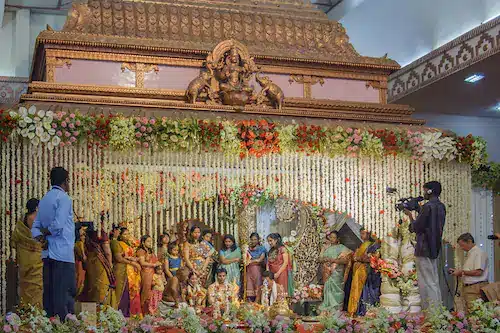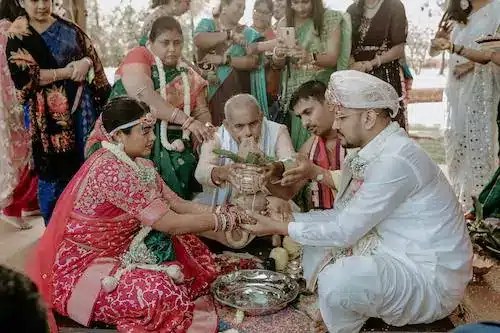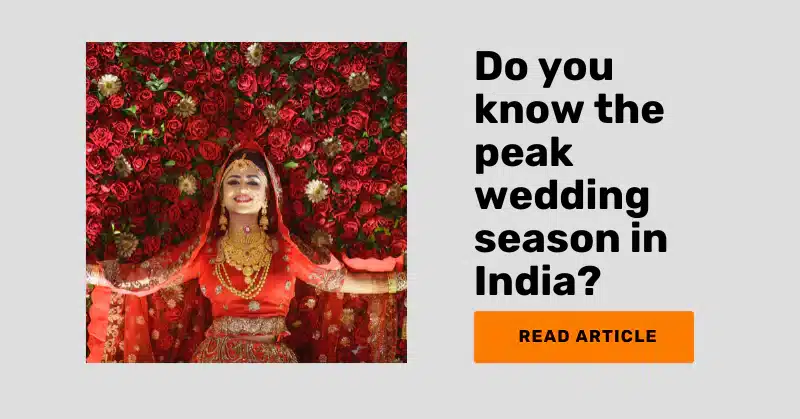Are you an aspiring wedding planner or a wedding planner gearing up for 2025?
You need to know what the upcoming wedding season in India has in store for you.
From profit predictions to the busiest months and dates, we’ll help you crack the code.
Prepare to mark your calendars as we deep dive into the wedding season in India.
A. What is a wedding season?
Wedding season refers to a period in the year when the majority of weddings take place. There is a significant increase in demand for wedding planners and venues.
The wedding season varies for different countries. It is determined by factors such as the ones listed below:
- Favorable weather conditions can result in more outdoor activities by the public. This makes both outdoor and indoor venues available to the audience. As a result, the demand matches the supply quite well and the pleasant weather is a win-win!
- Many cultures and religions have their norms governing auspicious days. For example, in Hindu culture, every year, some auspicious dates for weddings are predicted
In recent days, we also see new wedding seasons coming up due to personal preferences as well couples feel free to choose their wedding dates.
So while there are defined wedding seasons in many regions, there are few weddings that occur outside of it too.

B. Factors affecting the wedding season in India
In India, especially in Hindu culture, marriages are auspicious. Vedic astrology says that matches are made in heaven but get fulfilled on Earth.
As a result, a Shubh Muhurat or an auspicious date and time is set for such occasions. Multiple dates are considered Shubh Muhurat each year.
They may vary each year due to the position of the stars and planets.
Despite such variations, most weddings happen in December to January and mid-March to April.
Some weddings also sparsely occur between July to September.
Usually, weddings don’t take place during monsoon as it is said that Lord Vishnu arises from his sleep during this season.
Practically, it’s also hard to manage logistics during this season.
C. What is the wedding season in India?
Yes! There’s a peak wedding season in India. Here’s a breakdown of the wedding seasons in India.
The most preferred wedding season is between October and February. It also coincides with pleasant weather, making all types of venues available.
In North India, October to February are the busiest months for wedding planners. It coincides with cooler and pleasant weather. Dates in these months are also considered the most auspicious.
In South India, the climate supports a longer wedding season. Due to the moderate climate and religious diversity, you’ll observe weddings throughout the year. However, weddings rarely occur in the monsoon season.

As we have learned so far, regional variations do exist in the wedding season in India.
There’s a silver lining for wedding planners though. They can focus more on South Indian weddings when there’s an off-season in North India.
D. Religious considerations for wedding dates
79.8% population of India is Hindu by religion [source: Pew Research Centre]. Their primary wedding season in north India is October to March. For Southern India, the wedding season spans the whole year except monsoon months.
The next biggest religion in India is Islam. Accounting for 14.2% population of India, they don’t have as defined wedding seasons. However, we know which months and dates are the off-season. Muharram is avoided for weddings as it is a month of mourning [source: Islam QA].
Weddings during Ramadan are avoided as it is a month of fasting and prayer. However, the day after Ramadan or Eid-al-Fitr is ideal for weddings as it is a joyous occasion.
Christianity, which accounts for 2.3% population has its own wedding season in India. Spring, summer, and early fall are preferred as these months symbolize new beginnings [source: The Knot]. The pleasant weather during this time is another win-win!
However, Christian couples do skip Advent (leading up to Christmas) and Lent (leading up to Easter). This is because these months have somber themes embedded in religion.
Key Takeaway: Dates for weddings can also be influenced by the religious beliefs of the couple (e.g., Muslims avoiding Muharram and parts of Rabbi-al-Awwal).
E. Is the wedding season in India profitable for event planners?
Absolutely! The Confederation of All India Traders (CAIT) is expecting to earn its highest-ever profits. The predicted revenue is INR 4.74 lakh crore from 38 lakh marriages this wedding season.

In 2023, around 32 lakh weddings took place. A total of INR 3.75 lakh crore was spent [source: CNBC].
Delhi alone generates business worth INR 1 lakh crore. Imagine what other states may have to offer!
Contrary to popular belief, inflation doesn’t impact wedding season as much. Praveen Khandelwal, secretary general of CAIT, says that—”Inflation doesn’t impact wedding season, as people will spend come what may Not much scope to scale down wedding shopping, some restraint still possible for festive shopping,” he added.
F. Why are the wedding sizes getting smaller in India?
There’s a wave of intimate weddings entering India [source: CNBC].
Tina Tharwani, co-founder and wedding planner at Shaadi Squad, says that— ”Couples are moving away from “big, fat” Indian weddings toward intimate celebrations with a slimmer guest list”.
People prefer guest lists of under a hundred people.
However, it’s not bad news for event and wedding planners.
Smita Gupta, founder of Delhi-based wedding planner Wedlock Events says—“The success of weddings obviously depends on the guests, but it’s not the number of guests nowadays. They are more worried [about] the guest experience.”
This means that while weddings are getting less crowded, there’s still no compromise on the celebration.
With a shorter guest list, the couple can spend more on the decor, food, and overall experience.
Good News: Quality being preferred over quality might even give wedding planners more projects to work on!
G. Best dates to get married in 2025
| Suitable Month | Auspicious Wedding Dates in 2025 |
|---|---|
| January | 16th January, 2025 – Thursday 17th January, 2025 – Friday 18th January, 2025 – Saturday 19th January, 2025 – Sunday 20th January, 2025 – Monday 21st January, 2025 – Tuesday 23rd January, 2025 – Thursday 24th January, 2025 – Friday 25th January, 2025 – Saturday 26th January, 2025 – Sunday 27th January, 2025 – Monday |
| February | 2nd February 2025, Sunday 3rd February 2025, Monday 6th February 2025, Thursday 7th February 2025, Friday 12th February 2025, Wednesday 13th February 2025, Thursday 14th February 2025, Friday 15th February 2025, Saturday 16th February 2025, Sunday 18th February 2025, Tuesday 19th February 2025, Wednesday 21st February 2025, Friday 23rd February 2025, Sunday 25th February 2025, Tuesday |
| March | 1st March 2025, Saturday 2nd March 2025, Sunday 6th March 2025, Thursday 7th March 2025, Friday 12th March 2025, Wednesday |
| April | 14th April 2025, Monday 16th April 2025, Wednesday 17th April 2025, Thursday 18th April 2025, Friday 19th April 2025, Saturday 20th April 2025, Sunday 21st April 2025, Monday 25th April 2025, Friday 29th April 2025, Tuesday 30th April 2025, Wednesday |
| May | 1st May 2025, Thursday 5th May 2025, Monday 6th May 2025, Tuesday 8th May 2025, Thursday 10th May 2025, Saturday 14th May 2025, Wednesday 15th May 2025, Thursday 16th May 2025, Friday 17th May 2025, Saturday 18th May 2025, Sunday 22nd May 2025, Thursday 23rd May 2025, Friday 24th May 2025, Saturday 27th May 2025, Tuesday 28th May 2025, Wednesday |
| June | 2nd June 2025, Monday 4th June 2025, Wednesday 5th June 2025, Thursday 7th June 2025, Saturday 8th June 2025, Sunday 9th June 2025, Monday |
| November | 2nd November 2025, Sunday 3rd November 2025, Monday 8th November 2025, Saturday 12th November 2025, Wednesday 13th November 2025, Thursday 16th November 2025, Sunday 17th November 2025, Monday 18th November 2025, Tuesday 21st November 2025, Friday 22nd November 2025, Saturday 23rd November 2025, Sunday 25th November 2025, Tuesday 30th November 2025, Sunday |
| December | 4th December 2025, Thursday 5th December 2025, Friday 6th December 2025, Saturday |
Note: Wedding dates are not limited to these auspicious dates. Wedding dates or Shubh Muhurat are also personally tailored to individuals and the position of their planets. Thus, they can vary and fall outside of the scope defined in the article so far.
H. FAQ
1. What is a wedding planner?
A wedding planner manages the ideation and execution of weddings for clients. They take care of everything from budgeting, and venue, to on-site execution on the day of the event.
In layman’s terms, wedding planners are project managers for weddings. They ensure your dream wedding comes to life smoothly. All of the execution is taken care of by wedding planners so couples can relax and celebrate.
2. How can I become a wedding planner?
Becoming a wedding planner in the past was quite an unstructured journey back in the day. Earlier, they weren’t even called wedding planners but “tent wale” which means somebody who sets up tents for events.
Things have come really far since then and now it’s a very reputed profession to work in.
If you’re really keen on wedding planning, you’ll have to work on your knowledge first. In addition to courses and certifications, you’ll need to learn about the trends. Look at the wonders others are doing in the field.
You can then start working with other event planners or volunteer at events. Getting hands-on event planning experience will teach you that things are not as rosy as they look.
On-ground experience will allow you to learn the tough side of things.
You should also utilize this opportunity to network with event planners. Contacts come a long way in this business.
With good vendor contacts and potential clients, you can start working on your own brand. Create a website or social media account that also doubles as your portfolio.
Our advice: Build relationships everywhere you go. Whether they’re vendors or potential clients, these relationships always come in handy.
I. Summing up the wedding season in India
So far we have learned that wedding season in India follows a pattern.
There are many regional and religious differences in the wedding season in India. However, it would be safe to say that the monsoon season barely has any weddings.
To cope with the off-season lack of demand, you can shift your focus to other things.
Work on inventory management for the wedding season that is ahead.
Assemble a flexible team that is either willing to work contractually or work on other types of events.
Alternatively, you can also offer deals for pre-wedding events like engagements that happen all year round.
We hope you found our insights on the wedding season in India helpful.
To keep receiving such event planning insights, don’t forget to sign up for our newsletter below.







One Response
The wedding season in India is heavily influenced by favorable weather, auspicious dates, and cultural norms 🌞💍. With key dates determined by astrology, many couples plan their weddings around “Shubh Muhurats” for good fortune ✨. As 2025 approaches, understanding these factors is key for event planners and couples alike!